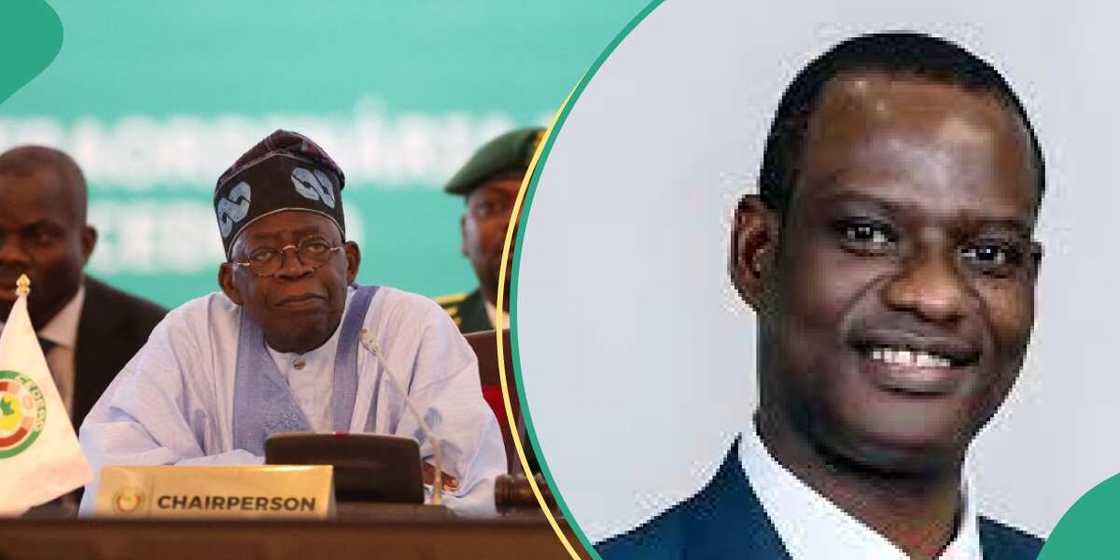Oyedele Explains How New Tax Laws Will Help FG Double Tax Revenues, Lists Nigerians Exempted
- When the conversations were ongoing about the tax reform, the tax committee promised that Nigerians earning N80,00 or less monthly would be excluded
- Now, the federal government has increased the threshold, allowing more Nigerians to be free from personal income tax
- Tax Committee chairman, Taiwo Oyedele, has explained the reasons for the change and mentioned the new income threshold.
Ruth Okwumbu-Imafidon, a journalist with Legit.ng, has over a decade of experience in business reporting across digital and mainstream media.
President Bola Tinubu finally signed the four tax bills into law on Thursday, June 27, 2025.
Speaking about the particulars of the newly signed tax law, the Chairman of the presidential fiscal policy and tax reforms committee, Taiwo Oyedele, said that poor Nigerians will be exempted from paying Personal Income Tax.
Oyedele explained on Politics Today, a Channels television programme, that the exemption is part of efforts from the government to protect the low-income earners in the country.

Read also
Nigerians kick as FG moves to add 5% fuel charge to petrol and diesel despite soaring prices

Source: Getty Images
He noted that the signing of the tax law moved Nigeria away from an opaque system to a more transparent and fair system that will operate more efficiently.
What class of income earners are exempted under the tax law?
According to Oyedele, this exemption will include all Nigerians earning N250,000 or less monthly.
Previously, the committee had proposed an exemption for Nigerians earning N1,000,000 (one million naira) in a year or about N83,000 monthly or less, and members of the armed forces.
However, the comment from the tax committee chairman indicates that the bandwidth has been reviewed upwards to include Nigerians earning N3,000,000 (three million naira) annually or less.
He noted that a family of five with a combined income of N250,000 or less would not be required to pay personal income tax or less under the law.
He said:
“If the earnings are about N250,000, they can take care of themselves. Of course, they are not going to have luxury, but at least they can take care of themselves. They are poor, and they shouldn’t pay taxes.
“We’ve eliminated taxes for the poor, reduced the burden on the middle, and only slightly increased it for the wealthy. That’s what fairness looks like.”
He described the tax law as pro-poor and pro-business, explaining that middle-income households earning between N250,000 to N2,000,000 a month will pay slightly lower taxes than they used to.
For the rich and high-income households earning above N2,000,000 monthly, the tax rate will slightly increase under the tax law, the Cable reports.
How Government plans to double taxes under the new law?
With the new law reducing tax for 90% of the Nigerian working population, the question on every mind is how the government plans to double its tax revenues.
According to Oyedele, the doubling of tax revenue will come from expanding the tax net to bring more people in without overburdening the struggling Nigerians with more taxes.

Read also
Key changes as Tinubu finally signs four tax reform bills into law, analysts explain benefits
He explained that tax compliance in Nigeria is currently about 30% with the government losing money to system inefficiencies, loopholes, and tax evasions.
By increasing the compliance to 60%, the government will double its tax revenues, he explained.
How FG will enforce compliance
Oyedele revealed that the government will digitally track the economic activity of Nigerians using the tools at its disposal, rather than just depending on World Bank benchmarks.
With the data, it will track those avoiding taxes. He said:
“Now we have the data. From your BVN, electricity bills, land purchases, bank accounts, and even your phone number, we can track economic activity. If you under-report, we’ll find out.”

Source: Getty Images
When does the new tax law take effect?
The Chairman of the Federal Inland Revenue Service (FIRS), Zacch Adedeji, has confirmed that implementation will commence from January 2026.
This will allow the tax body to put its house in order, especially since the tax law repeals the FIRS and institutes the NRS in its place.
What to expect under the new tax law
In related news, Legit.ng analysed in a previous article some major changes that will come with the new tax laws.
The first one is that the Federal Inland Revenue Service will be repealed and replaced by the Nigerian Revenue Service (NRS).
Also, the new law creates a tax ombudsman to resolve citizens' tax-related complaints.
Source: Legit.ng




